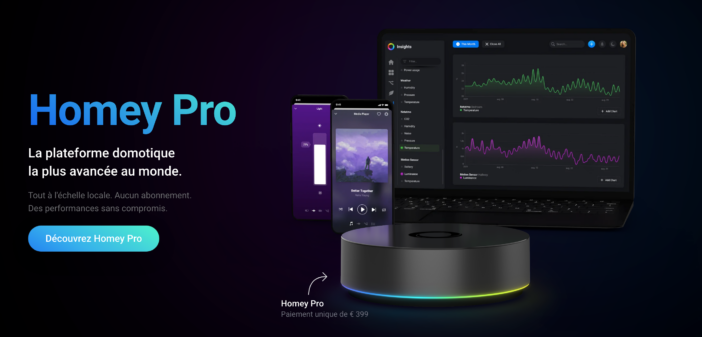We've already talked several times about the Homey solution, a highly open, multi-protocol home automation box that allows you to control your entire home. This solution was developed several years ago by a Dutch company called Athom, which was recently acquired by the South Korean appliance giant LG Electronics Inc. to facilitate the implementation of its smart home ecosystem. LG announced a few days ago that it had signed an agreement to acquire an 80% stake in Athom on the condition that it purchase the remaining 20% within the next three years. LG did not specify the value of the deal, but sources estimated it at around 85 billion won ($61 million). Following the transaction, Athom will continue to operate as an independent company under its current brand to maximize its growth potential and unique strengths while fostering synergies with LG in the smart home space, research and development capabilities, and platform utilization. With this equity investment, LG plans to integrate Athom's extensive connectivity, which connects thousands of appliances, sensors, and lighting devices, with LG's generative AI-powered ThinQ platform.The integration, LG said, aims to create an “AI Home,” which will allow customers to engage with generative AI to manage Internet of Things (IoT) appliances and devices and create a personalized environment tailored to their preferences.

“By integrating Athom's capabilities with LG's smart technology, LG aims to lead the era of AI-driven home innovation,” the Korean company said in a statement.
Homey, a comprehensive home automation solution
Athom, headquartered in Enschede, is known for Homey, a mobile and web application interface that allows third-party developers to add support for their products via the Homey smart home hub.Like other smart home hubs, Homey acts as a central point for configuring, controlling, and monitoring smart home components.Launched in 2014, Homey was first available in Europe, gaining a loyal following of several hundred thousand people. Homey devices are now also available in Australia, Singapore, the United States, and Canada.
Athom's flagship product, Homey Pro, offers connectivity to over 50,000 devices and supports a variety of connection methods, including Wi-Fi, Bluetooth, Z-Wave, Matter, and Thread, making it highly versatile and open. The Homey app store, managed by the Dutch company, offers approximately 1,000 apps for connecting and controlling home devices from brands such as Philips Hue and IKEA.
Goal: Combine LG ThinQ with Athom's open API
LG stated that its goal is to create a “space of intelligence” by integrating the LG ThinQ platform's smart home technology with Athom's open application programming interface (API), which will allow LG to incorporate third-party devices and services into its ecosystem.
The acquisition of Athom is a cornerstone of our AI home business. By leveraging the synergy between the two companies, we will expand our open ecosystem and external integration services, with the aim of providing customers with more diverse and multidimensional spatial experiences.
Jung Ki-hyun, Executive Vice President and Head of LG's Platform Business Center
A rapidly expanding field
According to market research firm TechNavio, the global smart home market is expected to grow from $81.2 billion in 2023 to $260.24 billion in 2028, at a compound annual growth rate of 26.2%.
LG's acquisition of Athom underscores its commitment to transforming itself from a hardware manufacturing company to a software-based platform company.
LG is evolving into a smart space solutions company that connects and expands experiences across diverse living spaces. We will continue to make strategic investments to shift our business paradigm, as evidenced by our successive advances in platform-based device services, such as the webOS advertising platform and the AI home.
Cho Joo-wan, CEO (known in the West by his English name William Cho)
We will, of course, be monitoring Homey's progress in the coming months, as such an acquisition can be highly beneficial, or unfortunately, undesirable. We've already seen cases in the past of solutions acquired by large groups, such as SmartThings (Samsung) or Lifedomus (DeltaDore), which either became closed solutions or simply disappeared because they were deemed unprofitable. Let's hope that Homey, on the contrary, can find a springboard for further growth!
Source:
Kedglobal






Please remain courteous: a hello and a thank you cost nothing! We're here to exchange ideas in a constructive way. Trolls will be deleted.